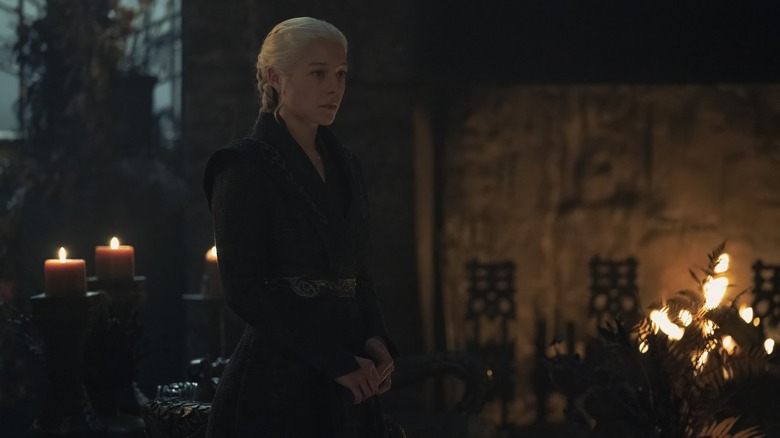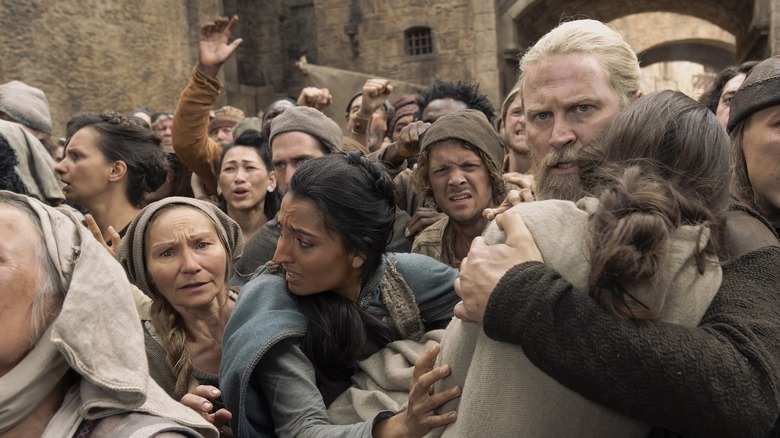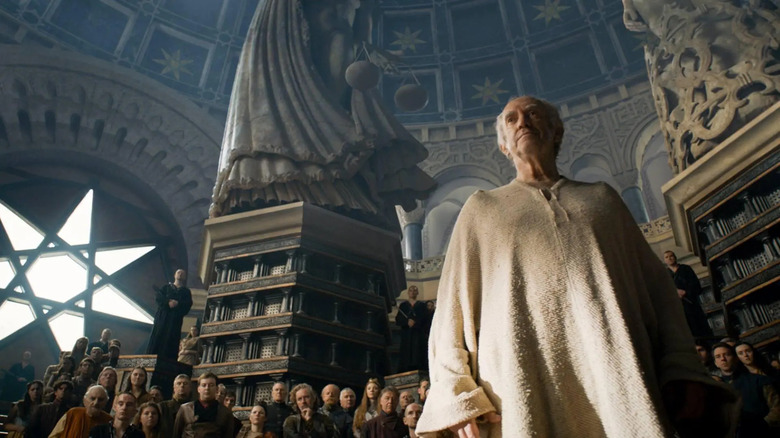House Of The Dragon Season 2 Shows Off Something We've Never Seen In Westeros Before
Spoilers for "House of the Dragon" follow.
In "House of the Dragon," war is in full effect. Both sides have taken heavy losses, an idiotic king made a dumb decision that ruined his life, and nothing will ever be the same. As much as Rhaenyra has tried to avoid an all-out war, there is no going back now, but what's interesting about season 2 of the show is how it's making sure the audience sees that the war is affecting every single part of the kingdom.
Unlike the War of the Five Kings in "Game of Thrones," which was a chaotic, sprawling mess with too many factions and characters, the Dance of the Dragon is much clearer and straightforward. With only two factions fighting, the conflict has taken over all of Westeros (except Dorne) but still feels relatively small since it's a family affair. With fewer and more clearly defined factions, "House of the Dragon" has been able to spend more time exploring the minutiae of warfare, the decision-making that comes before sending hundreds of people to their deaths, and also how the commoners react to it all.
This last bit is important because, for the most part, the smallfolk of Westeros in the time of Joffrey Baratheon, Robb Stark, and the other would-be-kings were kind of inconsequential. That's not the case in "House of the Dragon," where several characters have time and time again expressed the importance of the smallfolk to maintain power, and the dangers of turning them against their ruler.
And we saw just the kind of danger the smallfolk pose in the latest episode of season two of the Westeros-set prequel, when the spark was lit for something we haven't seen in this world before — a social revolution.
Mysaria's plans involve a smallfolk revolution
After the Battle at Rook's Rest, Rhaenyra realizes she needs more dragon riders to counter the mighty Vhagar, but there's still the PR disaster that came after the whole baby-killing deal. Thankfully she is not Aegon or Aemond. She actually listens to (some) advice. Specifically, advice from Mysaria, who is well aware that the true power lies with the smallfolk, and they are hungry and angry at The Greens. With a blockade keeping food out of reach for the citizens of King's Landing and the rich nobles of the Red Keep hoarding all the resources, a breaking point is just within reach. So Mysaria sends "gifts" from Rhaenyra to the people of King's Landing — small boats filled with food, the food they are certainly not getting from their current rulers.
What are people to do but be grateful at the only person who is seemingly still thinking of their well-being (even if that same person is the one doing a blockade on the city that prevents food from coming in)? And when those same people see their current rulers just frolicking around like nothing's wrong, it's hard not to root for them rioting and calling out for blood. An angry mob attacks Helaena and Alicent, while chanting "Love live Queen Rhaenyra!" One could almost picture a guillotine being brought out, because even if the two queens didn't die, a Kingsguard was beaten to death, and the riot doesn't seem to be stopping but spreading.
This scene was reminiscent of a similar riot in season 2 of "Game of Thrones" where the people of King's Landing attacked Joffrey in protest of the war. What makes this different is that it feels like the start of something bigger, something with a purpose.
The importance of the smallfolk in Westeros
Long before the Dance of the Dragon, there was also another conflict wherein the smallfolk threatened an entire regime — Maegor's war against the Faith Militant, a conflict that lasted almost a decade and ravaged the kingdom. This war involved plenty of common people taking arms against their ruler, specifically for religious purposes, but still. What made that different was that the Faith Militant Uprising was still mostly led by big houses, with the smallfolk serving as soldiers, rather than them actually leading any rebellion.
When the smallfolk attacked Joffrey in "Game of Thrones" and almost kill Sansa, they weren't calling for a specific new ruler to take Joffrey's place, they were just angry and out for blood. It still caused plenty of chaos, but eventually the revolts died down. Even when the High Sparrow brought back the Faith Militant and they briefly held the power at King's Landing, they were easily defeated by Cersei and kind of forgotten about immediately after a bombing killed the High Sparrow — despite this, presumably, making him a martyr and fueling further rebellion.
What makes the attack on Alicent and Helaena so curious and intriguing is that the smallfolk are specifically calling for Queen Rhaenyra. They see her as a savior for bringing food back into the city. They not only want Aemond out, but they want Rhaenyra back in, and they have the numbers to do it.
All throughout "Game of Thrones" we heard about the smallfolk not really caring about the big wars and conflict "so long as they are left in peace," as Jorah Mormont once said. Here we get proof that they do care, at least when it's convenient. "House of the Dragon" has an opportunity to give us something more dangerous than dragons — revolution.


